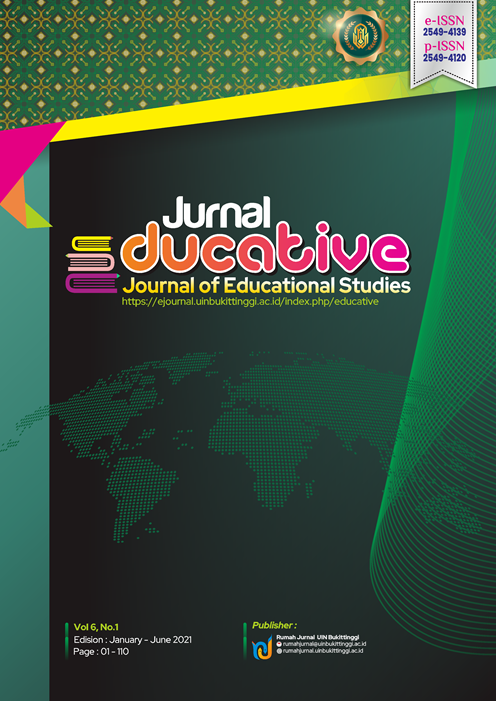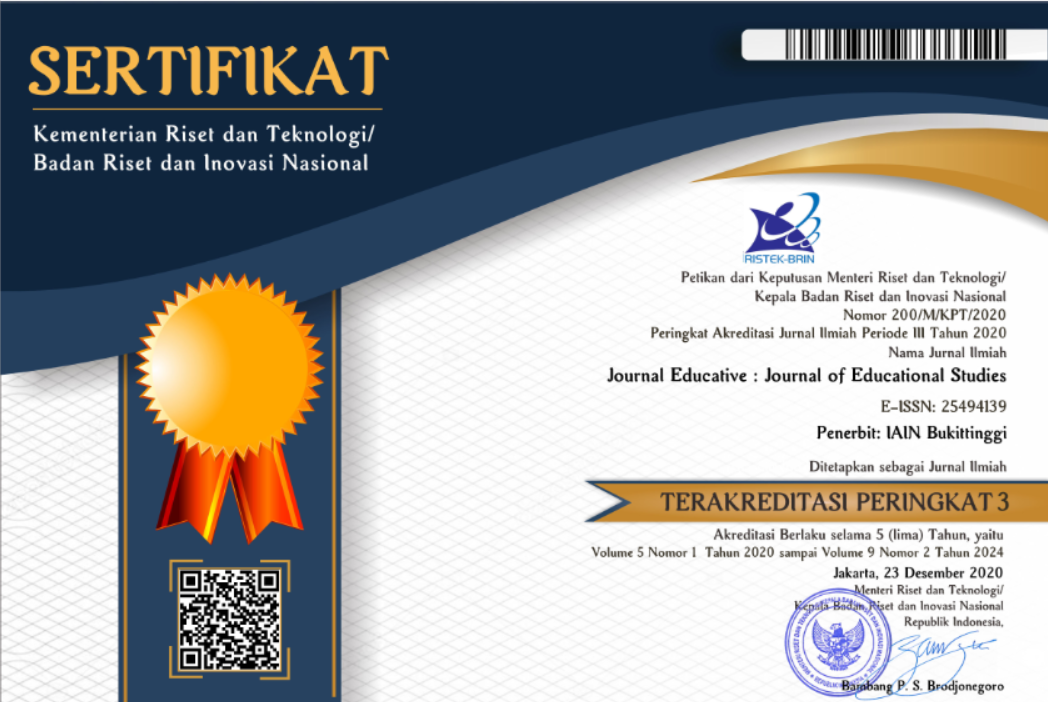Empowered Students in Era 5.0 Through Digital Preneurship
DOI:
https://doi.org/10.30983/educative.v9i1.8515Keywords:
Empowered, Digital Leadership, Student, Era 5.0Abstract
Era 5.0 is marked by deeper integration between technology and human life, with digitalization becoming the backbone of various aspects of life, including education and business. In this context, students are required to have relevant skills and knowledge in facing the challenges and opportunities offered. One of the crucial skills is digital entrepreneurship. This skill combines entrepreneurial concepts with digital technology to create and manage a business. However, the level of digital literacy in Indonesia is still low, only 62%, compared to the ASEAN average of 70%. Therefore, to overcome this problem, this research was carried out with the aim of evaluating the effectiveness of digital preneurship webinars in increasing student knowledge, skills, attitudes and motivation. The experimental method was used involving 47 students as participants. Pretest and posttest data were processed using the normality test and paired T test. The research results show that the pretest and posttest data are normally distributed, and there is a significant difference between the pretest and posttest results with the Sig value. 0.000 < 0.05. In conclusion, webinars are effective in increasing participants' knowledge about digital entrepreneurship.
Era 5.0 ditandai dengan integrasi yang lebih dalam antara teknologi dan kehidupan manusia dengan digitalisasi menjadi tulang punggung pada berbagai aspek kehidupan, termasuk pendidikan dan bisnis. Dalam konteks ini, mahasiswa dituntut untuk memiliki keterampilan dan pengetahuan yang relevan dalam menghadapi tantangan dan peluang yang ditawarkan. Salah satu keterampilan yang krusial adalah digital preneurship. Keterampilan ini menggabungkan konsep kewirausahaan dengan teknologi digital guna menciptakan dan mengelola bisnis. Namun, tingkat literasi digital di Indonesia masih rendah, hanya sebesar 62%, dibandingkan dengan rata-rata ASEAN sebesar 70%. Oleh karena itu untuk mengatasi masalah maka dilakukanlah penelitian ini dengan tujuan untuk mengevaluasi efektivitas webinar digital preneurship dalam meningkatkan pengetahuan, keterampilan, sikap, dan motivasi mahasiswa. Metode eksperimen digunakan dengan melibatkan 47 mahasiswa sebagai peserta. Data pretest dan posttest diolah menggunakan uji normalitas dan uji T berpasangan. Hasil penelitian menunjukkan bahwa data pretest dan posttest berdistribusi normal, dan terdapat perbedaan signifikan antara hasil pretest dan posttest dengan nilai Sig. 0.000 < 0.05. Kesimpulannya, webinar efektif dalam meningkatkan pengetahuan peserta tentang digital preneurship.
References
Books
Schwarz, Ori, Sociological Theory for Digital Society: The Codes That Bind Us Together (John Wiley & Sons, 2021)
Bawden, David, ‘Origins and Concepts of Digital Literacy’, Digital Literacies: Concepts, Policies and Practices, 30.2008 (2008), 17–32
Journals
Akintolu, Morakinyo, and Moeketsi Letseka, ‘The Andragogical Value of Content Knowledge Method: The Case of an Adult Education Programme in Kwa-Zulu Natal Province of South Africa’, Heliyon, 7.9 (2021)
Batista-Canino, Rosa M, Lidia Santana-Hernández, and Pino Medina-Brito, ‘A Scientometric Analysis on Entrepreneurial Intention Literature: Delving Deeper into Local Citation’, Heliyon, 9.2 (2023)
Brogan, Donna R, and Michael H Kutner, ‘Comparative Analyses of Pretest-Posttest Research Designs’, The American Statistician, 34.4 (1980), 229–32
Chang, Chu-Yang, Hsu-Chan Kuo, and Zhengyi Du, ‘The Role of Digital Literacy in Augmented, Virtual, and Mixed Reality in Popular Science Education: A Review Study and an Educational Framework Development’, Virtual Reality, 27.3 (2023), 2461–79
Edward, Edward, Fitri Chairunnisa, and Ade Perdana Siregar, ‘Digitalpreneur Competency Model and Digital Literacy on MSME Business Performance in Jambi Province’, Dinasti International Journal Of Management Science, 4.3 (2023), 473–82
Eno, Diko, ‘Pakar Keamanan Siber: Rendahnya Literasi Digital Indonesia Membuat Rentan Terhadap Serangan Hacker’, Suara Kalbar, 2024, p. 1 <https://www.suarakalbar.co.id/2024/06/pakar-keamanan-siber-rendahnya-literasi-digital-indonesia-membuat-rentan-terhadap-serangan-hacker/>
Fernandes, Cristina, João J Ferreira, Pedro Mota Veiga, Sascha Kraus, and Marina Dabić, ‘Digital Entrepreneurship Platforms: Mapping the Field and Looking towards a Holistic Approach’, Technology in Society, 70 (2022), 101979
Gardner, Madelyn, Emily C Hanno, Stephanie M Jones, and Nonie K Lesaux, ‘Exploring Early Educator Burnout and Process Quality in a Statewide Sample’, Journal of School Psychology, 99 (2023), 101214
Gegenfurtner, Andreas, and Christian Ebner, ‘Webinars in Higher Education and Professional Training: A Meta-Analysis and Systematic Review of Randomized Controlled Trials’, Educational Research Review, 28 (2019), 100293
Gibb, Allan, ‘In Pursuit of a New ‘Enterprise’and ‘Entrepreneurship’Paradigm for Learning: Creative Destruction, New Values, New Ways of Doing Things and New Combinations of Knowledge’, International Journal of Management Reviews, 4.3 (2002), 233–69
Gupta, Varun, ‘Strategic Alliances with University Libraries’, in Innovation Mechanisms in Start-Ups: Practice, Strategies and Impacts (Springer, 2022), pp. 23–38
McMullen, Jeffery S, Katrina M Brownell, and Joel Adams, ‘What Makes an Entrepreneurship Study Entrepreneurial? Toward a Unified Theory of Entrepreneurial Agency’, Entrepreneurship Theory and Practice, 45.5 (2021), 1197–1238
Musa, Safuri, Sri Nurhayati, and Rahmi Zubaedah, ‘Peningkatan Kompetensi Pemasaran Produk Warga Belajar Pusat Kegiatan Belajar Masyarakat Melalui Pelatihan Marketplace Dan Canva’, JMM (Jurnal Masyarakat Mandiri), 6.6 (2022), 4533–42
Nurhayati, Sri, ‘Improving Teachers’ Entrepreneurship Skills in the Industry 4.0 through Online Business Workshops’, in Teacher Education and Professional Development In Industry 4.0 (CRC Press, 2020), pp. 81–86
Nurhayati, Sri, Safuri Musa, Gumpanat Boriboon, Rina Nuraeni, and Shindriani Putri, ‘Community Learning Center Efforts to Improve Information Literacy in the Community for Cyber Crime Prevention during a Pandemic’, Journal of Nonformal Education, 7.1 (2021), 32–38
Nurjanah, Siti, Sri Nurhayati, and Ansori Ansori, ‘Implementasi Program Kewirausahaan Sayur Dalam Upaya Meningkatkan Perekonomian Pondok Pesantren’, Comm-Edu (Community Education Journal), 6.3 (2023), 330–37
Orrensalo, Thao, Candida Brush, and Shahrokh Nikou, ‘Entrepreneurs’ Information-Seeking Behaviors in the Digital Age–A Systematic Literature Review’, Journal of Small Business Management, 62.2 (2024), 892–937
Park, Hyejin, Han Sung Kim, and Han Woo Park, ‘A Scientometric Study of Digital Literacy, ICT Literacy, Information Literacy, and Media Literacy’, Journal of Data and Information Science, 6.2 (2021), 116–38
Priatmoko, Setiawan, Billal Hossain, Wuri Rahmawati, Susilo Budi Winarno, and Lóránt Dénes Dávid, ‘Webinar among Indonesian Academics during Covid-19, Embracing the Audiences’, Plos One, 17.3 (2022), e0265257
Rani, Inta Hartaningtyas, Lestari Adhi Widyowati, and Jara Hardiyanti Jalih, ‘Pembekalan Mahasiswa ITB-Ahmad Dahlan Karawaci Melalui Webinar “Berani Memulai Bisnis Di Era Digital”’, Jurnal Abdi Masyarakat Indonesia, 2.1 (2022), 125–32
Sakti, Rizki Hardian, Wirda Yetti, and Risky Ema Wulansari, ‘Technopreneurship and It-Preneurship in Vocational Education Perspective: Perspective Theory’, Jurnal Pendidikan Teknologi Kejuruan, 3.4 (2021), 194–98
Setiadi, Dudi, Sri Nurhayati, Ansori Ansori, Mohamad Zubaidi, and Rudi Amir, ‘Youth’s Digital Literacy in the Context of Community Empowerment in an Emerging Society 5.0’, Society, 11.1 (2023), 1–12
Xia, Yuhuan, Xiyao Liu, Xueling Wang, Hui Deng, Changlin Han, Zhen Liu, and others, ‘The Power of Role Models in a Team: The Impact of Lead Entrepreneur’s Digital Leadership on Digital Entrepreneurial Success’, Information Processing & Management, 60.6 (2023), 103498
Young, Ryan, Luke Wahlberg, Elaina Davis, and Kaveh Abhari, ‘Towards a Theory of Digital Entrepreneurship Mindset: The Role of Digital Learning Aptitude and Digital Literacy’, in 26th Americas Conference on Information Systems, AMCIS, 2020, pp. 1–10
Downloads
Published
How to Cite
Issue
Section
Citation Check
License
Copyright (c) 2024 Sri Nur Hayati, Sumiati

This work is licensed under a Creative Commons Attribution-ShareAlike 4.0 International License.
Authors who publish with this journal agree to the following terms:
1. Authors retain copyright and grant the journal right of first publication with the work simultaneously licensed under a Creative Commons Attribution License that allows others to share the work with an acknowledgment of the work's authorship and initial publication in this journal.
2. Authors are able to enter into separate, additional contractual arrangements for the non-exclusive distribution of the journal's published version of the work (e.g., post it to an institutional repository or publish it in a book), with an acknowledgment of its initial publication in this journal.
3. Authors are permitted and encouraged to post their work online (e.g., in institutional repositories or on their website) prior to and during the submission process, as it can lead to productive exchanges, as well as earlier and greater citation of published work (See The Effect of Open Access).




